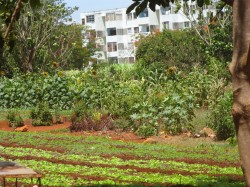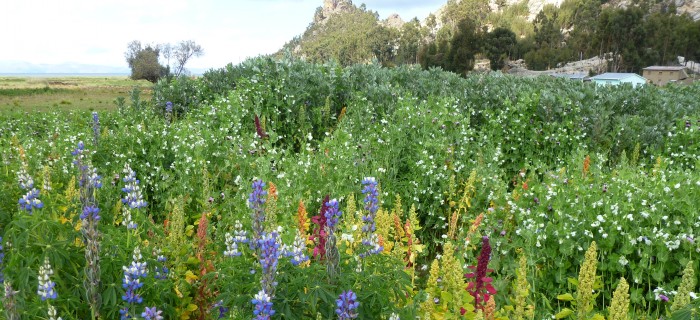The Potential of Agroecology to Combat Hunger in the Developing World
October 1998, Policy Brief No. 2
Introduction
In this policy brief we argue that the agroecological approach to food production offers more hope of combating hunger in a sustainable fashion than does the more conventional “green revolution” strategy. While agroecological technology is suitable for small farmers, has positive impacts on equity and is environmentally friendly, the green revolution and similar approaches have caused serious land degradation and have accentuated rural inequality—the root cause of hunger.
Hunger and the Green Revolution Approach
Hunger and malnutrition affect nearly 800 million people in the developing world. By and large those problems are not due to an absolute scarcity of food, but to the more complex issues of who grows food and how and where it is grown, how it is distributed, and finally, who has access to it. In this complicated web of causality, inequality is the outstanding driving force behind hunger. Misuse and over-exploitation of natural resources are other factors underlying food gaps. Any technological policy for rural and agricultural development must be judged on, among other factors, whether it tends to increase or decrease inequity in the distribution of and access to resources and food, and whether it ensures sustainability of resource use.
While agroecology is suitable for small farmers, has positive impacts on equity and is environmentally friendly, the green revolution has caused serious land degradation and has accentuated rural inequality.
Proponents of a ‘second’ green revolution (GRII) generally argue that scarcity and low agricultural productivity cause food insecurity and will also aggravate global hunger in the future. Those holding this perspective usually believe that “overpopulation” and food scarcity cause hunger, and likewise, dwell on aggregate global food production/consumption figures to justify GRII, but seldom look at distribution and disparities at the local or regional level. Therefore they propose a new wave of agricultural intensification based on increased fertilizer and pesticide use in Africa and pans of Latin America, bioengineered crop varieties, and trade policies that would allow northern food supplies to cover for any ‘food gaps’ remaining in the South after GRII. Likewise, they usually promote the agroindustrial model that stresses uniformity, standardized technologies for large scale high-input and mechanized systems, aimed at maximizing yields of commercial crops, to fuel a global food system.
 Yet evidence from the first green revolution suggests that the GRII approach is unlikely to be the appropriate strategy to end hunger. Serious concerns have been raised by economic analysts, NGOs (non-governmental organizations), and farmers in many parts of the world. The original green revolution technological packages have in many cases generated soil, pest, and weed problems, sometimes leading to long-term yield decline. At the same time inequality has usually grown, as larger farmers have benefited earlier and disproportionately from adoption of costly inputs. The GRII emphasis on capital-intensive, off-farm, chemical inputs, is likely to both reinforce yield leveling or decline, and generate further inequity, thus making it a less than ideal policy package for attacking hunger. Furthermore, the dumping of Northern country food surpluses is already a key factor depressing productivity in the South, casting doubt on the soundness of further trade liberalization in basic foodstuffs. Finally, bioengineering usually produces varieties that are not locally adapted and whose purchase is difficult for cash-strapped farmers. The widespread introduction of such varieties poses environmental risks and can reduce the genetic diversity of food crops and varieties, elevating risk and food insecurity for farmers in many areas.
Yet evidence from the first green revolution suggests that the GRII approach is unlikely to be the appropriate strategy to end hunger. Serious concerns have been raised by economic analysts, NGOs (non-governmental organizations), and farmers in many parts of the world. The original green revolution technological packages have in many cases generated soil, pest, and weed problems, sometimes leading to long-term yield decline. At the same time inequality has usually grown, as larger farmers have benefited earlier and disproportionately from adoption of costly inputs. The GRII emphasis on capital-intensive, off-farm, chemical inputs, is likely to both reinforce yield leveling or decline, and generate further inequity, thus making it a less than ideal policy package for attacking hunger. Furthermore, the dumping of Northern country food surpluses is already a key factor depressing productivity in the South, casting doubt on the soundness of further trade liberalization in basic foodstuffs. Finally, bioengineering usually produces varieties that are not locally adapted and whose purchase is difficult for cash-strapped farmers. The widespread introduction of such varieties poses environmental risks and can reduce the genetic diversity of food crops and varieties, elevating risk and food insecurity for farmers in many areas.
Stay in the loop with Food First!
Get our independent analysis, research, and other publications you care about to your inbox for free!
Sign up today!

 Help Food First to continue growing an informed, transformative, and flourishing food movement.
Help Food First to continue growing an informed, transformative, and flourishing food movement.




